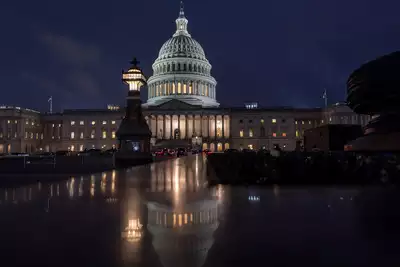[ad_1]
A last-minute vote on Friday in the US House of Representatives saw over 30 Republicans voting against a critical spending bill designed to avert a partial government shutdown, signaling a deepening divide within the party on fiscal policy.
The bill, designed to extend government funding until March 14, passed with 34 Republicans voting against it, while no Democrats opposed it. One Democrat, Rep. Jasmine Crockett (D-Texas), voted present. The bill now heads to the Senate, where it will face further scrutiny before potentially reaching President Biden’s desk. The president has indicated he will sign the bill if it clears the Senate.
Among the Republicans who voted against the measure were prominent figures such as Rep. Tim Burchett (R-Tenn.), Rep. Lauren Boebert (R-Colo.), Rep. Jim Banks (R-Ind.), Rep. Andy Biggs (R-Ariz.), Rep. Dan Bishop (R-N.C.), and Rep. Chip Roy (R-Texas), who strongly objected to the $100 billion allocated for the Biden administration.
Rep. Burchett criticized the bill, and was quoted by the Fox News Digital as saying, “I don’t know why we’re giving Joe Biden $100 billion to play with in 30 days. Oddly enough, it didn’t have what Trump wanted most of all.”
This vote followed a chaotic week of negotiations, during which lawmakers scrambled to reach an agreement. A bipartisan 1,547-page spending proposal was released on Tuesday, but it fell apart after backlash from figures like Elon Musk and Republican presidential candidate Vivek Ramaswamy.
A Trump-backed, more condensed version of the bill was introduced Thursday night but also failed to gain traction. Ultimately, the bill that passed Friday marked a return to a more traditional funding approach, although it still faced considerable pushback from conservative Republicans.
Rep. Boebert, known for her fierce criticism of President Biden, explained her vote by saying, “I’m just ready for President Trump to be back.”
Other Republicans who voted against the bill included Rep. Josh Brecheen (R-Okla.), Rep. Andy Harris (R-Md.), Rep. Michael Cloud (R-Texas), Rep. Eli Crane (R-Ariz.), Rep. John Curtis (R-Utah), Rep. Scott DesJarlais (R-Tenn.), Rep. Russ Fulcher (R-Idaho), Rep. Tony Gonzales (R-Texas), Rep. Bob Good (R-Va.), Rep. Lance Gooden (R-Texas), Rep. Glenn Grothman (R-Wis.), Rep. Eric Burlison (R-Mo.), Rep. Andrew Clyde (R-Ga.), Rep. Nancy Mace (R-S.C.), Rep. Thomas Massie (R-Ky.), Rep. Rich McCormick (R-Ga.), Rep. Cory Mills (R-Fla.), Rep. Alex Mooney (R-W.Va.), Rep. Andy Ogles (R-Tenn.), Rep. Scott Perry (R-Pa.), Rep. Matt Rosendale (R-Mont.), Rep. Diana Harshbarger (R-Tenn.), Rep. Wesley Hunt (R-Texas), Rep. Debbie Lesko (R-Ariz.), Rep. Greg Lopez (R-Colo.), Rep. Chip Roy (R-Texas), and Rep. Tom Tiffany (R-Wis.).
With the shutdown deadline looming, the House’s action has cleared a path to avert a shutdown, but the Senate’s approval is still uncertain. Should the bill pass in the Senate, it will head to President Biden, who has signaled his intention to sign it and avoid a shutdown.
[ad_2]
Source link








